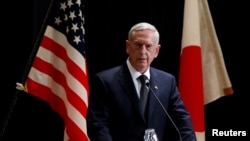The U.S. defense secretary says the United States recognizes Japan’s administration of the Senkaku Islands; a comment quickly criticized by China.
Jim Mattis said Saturday in Tokyo that in talks with his Japanese counterpart, Tomomi Inada, he “made clear that our longstanding policy on the Senkaku Islands stands.”
The uninhabited, contested islands are known as the Senkaku in Japan and as the Diaoyu in China. Both countries claim sovereignty, and China has created artificial islands in the contested South China Sea area.
In addition, Taiwan, Malaysia, Vietnam, the Philippines and Brunei also claim parts of the waters that contain strategic sea lanes and rich fishing grounds, as well as oil and gas deposits.
No military moves
Mattis, however, stopped short of calling for any military moves in the area.
“What we have to do is exhaust all efforts, diplomatic efforts, to try to resolve this properly, maintaining open lines of communication,” Mattis said. “At this time we do not see any need for dramatic military moves.”
The U.S. defense secretary criticized China for the distrust it has caused with its assertiveness in the South China Sea region.
“China has shredded the trust of nations in the region, apparently trying to have a veto authority over the diplomatic and security and economic conditions of neighboring states,” Mattis said.
China responds
In Beijing, a Chinese Foreign Ministry spokesman criticized the U.S. stance on the contested area. Lu Kang called on the U.S. to “... take a responsible attitude, stop making wrong remarks on the issue involving the Diaoyu islands, sovereignty, and avoid making the issue more complicated and bringing instability to the regional situation.”





